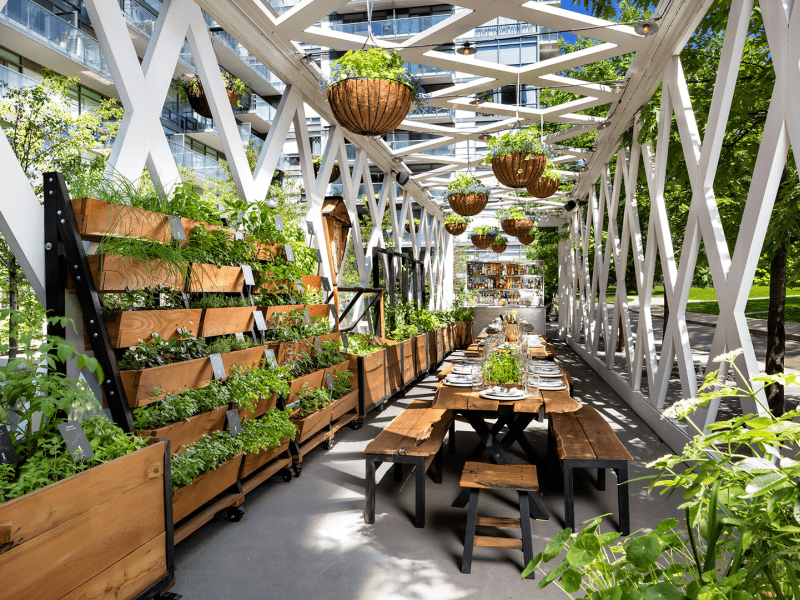Reducing Waste with Haste
The harsh truth is that waste occurs across every sector and every level of the supply chain. As a platform for change, we’re doing something about it, and we hope to inspire you to do the same.

Every year, the city of Toronto alone generates 900,000 tons of waste. You can find waste in every room in our homes, in the hotels and restaurants we visit, and even in the fields (industrial and agricultural) that we rely on for goods. In fact, we’re sad to say that traditional hotel and restaurant practices plan for waste.
This careless nature is not only expensive, it’s a social and environmental tragedy. Waste brings along depletion of natural resources, catastrophic amounts of climate pollution, complete destruction of lands, contamination of water, wasted (and often unethical) labor hours, colossal amounts of landfill waste, and increasing devastation for underserved communities.
The good news is that all of us—as brands and as humans—have the power to do something about it, together.
While many in hospitality are now recognizing and responding to the urgent need to divert waste, it’s been a part of our sustainable mission from day one. As a platform for change, we hope to inspire you—and other brands—to do the same through efforts such as 1 Hotel Toronto’s Zero Waste Initiative.
Food Waste in the Hospitality Industry
We’ve mentioned that food waste spans all industries and levels of the supply chain. But we’d like to place the spotlight on the problem of food waste within the hospitality industry, as it paints a clear picture of the careless and avoidable nature of waste in our everyday lives.
The hospitality industry is aware of the sheer volume and consequences of its significant food waste. But historically, it has always prioritized guest satisfaction over waste mitigation. As a result:
- Over 40% of food waste in industrialized countries comes from consumer-facing businesses, including hotels.
- Hotel kitchens typically plan for 3-5% of food purchases to be claimed as unavoidable food waste.
- Hotel kitchens actually waste 5-15% of the food they’ve purchased, and two-thirds of this food is wasted before it ever reaches the guest’s plate.
- Further, 55% of edible leftovers are left behind at the restaurant.
- It’s estimated that about 46% of solid waste produced by hotels comes from food and non-recyclables.
- According to a case study, the highest amount of food waste (by weight) comes from food left on plates.
This not only highlights the fact that hotels contribute a massive amount to the food waste (and overall waste) epidemic—it highlights the need for hotels and guests to work together to combat it. It’s a multi-layered issue, and it’s going to take all of us to move forward.
Here’s a look into some of the ways we’re playing our part—actively questioning, measuring, and managing waste at every level of our operations.
1 Hotel Toronto’s Zero-Waste Initiative
Our newest urban sanctuary, 1 Hotel Toronto, is setting the stage for waste diversion. As a true platform for change, the property is fueled by an inspiring Zero Waste Initiative that upholds the following promises.
- Within our first month of operation, we will achieve over 90% in total waste diversion from landfills.
- Within our first year of operation, we will achieve over 93% in total waste diversion from landfills and obtain a zero-waste certification.
Yes, these are bold promises. But they’re backed up by bold and innovative waste management practices, some of which include:
- Reducing Consumption: Our 1 Team Recharge Program is an internal ordering process that helps us reduce waste at the point of purchase. Meals are made to order, made with intentional, quality ingredients, and packaged in reusable containers.
- Utilizing Natural Resources: We’re collaborating with Toronto-based craftsmen from Just Be Woodsy to create hundreds of chairs, tables, credenzas, and pieces of art out of local fallen Oaks, Ashes, Maple and Walnut trees. We also focus on providing everyday items like key fobs, hangers, and pens made from natural materials instead of plastic.
- Recycling: Our recycling partner, Green For Life (GFL) will measure our diversion rate to ensure we’re doing the best we can. This will help us reduce the property’s overall waste while promoting the recyclability of food packaging, to-go containers, and more within 1 Hotel Toronto’s kitchens.
- Composting: Our on-site organic composter can reduce 12,000 pounds of waste to under 1,000 pounds of compost per month. Instead of reaching landfills, this organic waste will be used to feed over 2,500 plants across the property and neighboring parks.
- Baling: A baler is a machine that compresses cardboard into a bundle (bale). This reduces the volume of waste before recycling and maximizes our recycling bin space.
- Glass Crushing: Our glass crusher will turn glass waste into sand that’ll be used to help aerate the property’s soil. This will also help maximize our recycling bin space.
As a result, our current waste diversion rate is 83.45% and counting, and we can’t wait to achieve that 90% within our first month of operation.
How Can You Help?
We want to provide you with the tools to feel inspired and empowered to reduce your personal waste, whether you’re at home or your home away from home.
But first, there’s an elephant in the room that we need to address. We keep saying that the issue of waste is two-sided, stemming from both industries and consumers, so let’s reflect back on the illustrative topic of food waste.
What we haven’t mentioned is that the largest amounts of food waste come from people in their own homes. (Don’t worry, that means us too!) In fact, over 50% of food wasted in Toronto single-family households is avoidable—stemming from leftovers and untouched food that could have been eaten.
So the question becomes: what can we all do to help?
The short answer is: we need to engage in education, action, and policy.
Now, we know that may seem daunting, but we have the perfect place to start. We encourage you to check out the Food and Agriculture Organization’s (FAO) global report, Reducing the Food Waste Footprint. The report highlights the path forward for commercial entities and individuals at home.
Beginning on page 39, it discusses food waste at the consumer level, outlining action items such as improving your consumption habits and advocating for legislation to reduce food waste. It discusses the fact that even simple mindset shifts—like being open to imperfect produce—can help reduce food waste.
On top of that, if you reside in the US, we encourage you to check out WASTED, NRDC’s second landmark food waste report. The report includes encouraging, action-inspiring information, for example:
- It outlines the current state of food waste in America.
- It outlines the current state of global food waste.
- It celebrates waste-diversion wins that have happened since the first report in 2012.
- It discusses the need to advocate for legislation that removes barriers and protects food donation efforts.
- It discusses the need to advocate for infrastructure investments that will expand waste diversion options.
- On page 42, it outlines 11 specific actions that you, as an individual, can take to fight food waste. Some specific actions include shopping local, buying smaller portions, understanding food labels, and properly utilizing your freezer.
Perhaps most importantly, it reaffirms the concept that every little effort counts. In the world of waste, every single individual, and every single hotel across the country can take intentional steps to reprogram our habits—saving food, consumer goods, money, water, energy, labor, and land from being wasted.













